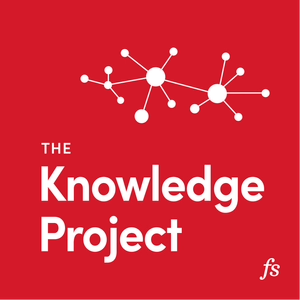
The Abraaj Fiasco
04/20/21 • 18 min
I wanted to experiment with a different format for this episode and share my writings on the Abraaj fraud scandal as they were happening in real time a few years ago.
Now, for those who don’t know Abraaj, it was one of the largest — and probably the flashiest — private equity firms dedicated to investing in emerging markets. It was spearheading a big push into impact investing and was marketing a $6B fund when it collapsed in insolvency under allegations of fraud.
There are a few reasons why I wanted to revisit my articles:
- First, the founder of Abraaj — a man named Arif Naqvi — had been fighting a battle in UK courts to avoid extradition to the United States. He lost that fight earlier this year.
- Second, there’s a book coming out in July called The Key Man: The True Story of How the Global Elite Was Duped by a Capitalist Fairy Tale by two reporters at The Wall Street Journal — Simon Clark and Will Louch. I’m keen to bring them on the podcast to discuss the book and I wanted to provide some context in the hopes that one or both of them will join me in a few months’ time.
- Third, the Abraaj story is a useful prism for seeing the world as it is — unvarnished. As you listen, I encourage you to think about how social capital, branding, and reputation are manufactured; how an industry that talks about due diligence did little to none; and the credulity that money buys.
So, there will be four parts to the story I share today. The first three were from the February, March, and April 2018 editions of Portico’s much-beloved, monthly newsletter, Portico Perspectives.
The final part comes from the July 2018 edition.
As noted, this is an experiment, so please let me know what you think about the format and content.
This podcast was recorded in April 2021.
Sign up for Portico Perspectives.
I wanted to experiment with a different format for this episode and share my writings on the Abraaj fraud scandal as they were happening in real time a few years ago.
Now, for those who don’t know Abraaj, it was one of the largest — and probably the flashiest — private equity firms dedicated to investing in emerging markets. It was spearheading a big push into impact investing and was marketing a $6B fund when it collapsed in insolvency under allegations of fraud.
There are a few reasons why I wanted to revisit my articles:
- First, the founder of Abraaj — a man named Arif Naqvi — had been fighting a battle in UK courts to avoid extradition to the United States. He lost that fight earlier this year.
- Second, there’s a book coming out in July called The Key Man: The True Story of How the Global Elite Was Duped by a Capitalist Fairy Tale by two reporters at The Wall Street Journal — Simon Clark and Will Louch. I’m keen to bring them on the podcast to discuss the book and I wanted to provide some context in the hopes that one or both of them will join me in a few months’ time.
- Third, the Abraaj story is a useful prism for seeing the world as it is — unvarnished. As you listen, I encourage you to think about how social capital, branding, and reputation are manufactured; how an industry that talks about due diligence did little to none; and the credulity that money buys.
So, there will be four parts to the story I share today. The first three were from the February, March, and April 2018 editions of Portico’s much-beloved, monthly newsletter, Portico Perspectives.
The final part comes from the July 2018 edition.
As noted, this is an experiment, so please let me know what you think about the format and content.
This podcast was recorded in April 2021.
Sign up for Portico Perspectives.
Previous Episode

Viktor Shvets on The Great Rupture
In this episode of the Portico Podcast I speak with Viktor Shvets, a global strategist at Macquarie, and the author of the deeply thought-provoking book The Great Rupture, which investigates the past and interrogates current trends to probe the question: do we need to be free to be innovative, prosperous, or even happy?
You know, when I started this company, I laid out three philosophical principles for its ethos: intergenerational equity; value creation > value extraction; and intellectual curiosity — particularly a belief in the importance of contextual and interdisciplinary thinking and open exchange.
As you’ll hear, Viktor’s comments deftly navigate these three principles.
You may want to grab a pen and some paper to take notes for this episode because Viktor is a polymath who will engage your brain in some important — and at times, unsettling — thought experiments.
In today’s conversation, Viktor and I discuss:
- Why he wrote a book that looks for lessons in the 12th to 15th Centuries to guide us through the next two decades;
- Whether the ‘operating system’ of open markets, property rights, and open minds that generated prosperity in the past is in retreat — and even if it were, would it matter;
- The confluence of the information revolution and financial revolution, and how these two forces are hollowing out the core frameworks of society;
- The state’s usurpation of the free market and what it means for capitalism and commercial banking;
- The prospects for emerging markets in an era of de-globalization and the importance of non-tradable sectors across EM;
- We even talk about Andrew Yang and the possibility that universal basic income might liberate people from scarcity, and empower them to live lives of their choosing.
But there is so, so much more.
This is a good companion to my interview with Tom Burgis in Episode 4 on The Rise of Kleptocracy, and the topic of corruption comes up a couple times in this episode, so you should check out Episode 4 if you haven’t already.
And I’ve also included links in the show notes that will point you to a few additional readings that Viktor and I discuss, including some of my own writings over the last decade that have marinated over some similar themes.
I hope you enjoy the conversation.
This podcast was recorded in February 2021.
Learn more about Viktor and the book.
Buy The Great Rupture at Amazon, Barnes & Noble, IndieBound, Waterstones.
Next Episode

Greg Bowes on The State of EM Private Markets
An interview with Greg Bowes, Co-Founder and Managing Principal of Albright Capital
___
One of the questions I’ve often pondered since founding this business is: is emerging markets private equity dying?
That literally was the name of the first study I published when I launched the company in 2016, and I — perhaps naively — thought that drawing attention to some of the industry’s problems might catalyze people to action.
To put some figures on it, between 2010 and 2015, the number of growth equity funds achieving a close had declined by more than 30%, and fund vehicles greater than or equal to $1 billion in size grew from 40% to 60% of all capital raised.
So capital was consolidating in fewer, larger managers — mostly in Asia — while at the same time the number of first-time funds holding a final close had been declining by 10% each year. And the development finance institutions were exacerbating the trends, committing to more Funds IV+ than to Funds I, II, or III.
Did things change?
Suffice it to say that last October I put out a newsletter that reframed the question to: is EM PE dead?
So, I wanted to bring on someone who could speak to the state of EM private markets.
That guest is Greg Bowes, Co-Founder and Managing Principal of Albright Capital — a global investment firm with expertise in special situations, infrastructure, infrastructure services, and real assets.
The label ‘variant perception’ gets bandied about quite a lot, mostly as nonsense. But Greg has a different view on EM private markets than most of the managers I’ve met, and I thought he’d be a great guide to walk through where the industry is in the summer of 2021.
In today’s conversation, Greg and I discuss:
- Should investors even be investing in EM private markets?
- The impact of currency depreciations on performance and whether investors should hedge.
- The shortcomings of the traditional approach to EM private equity and whether it magnifies the impacts of adverse cross-currency movements.
- The problem of herd behavior.
- The importance of sound deal structuring in EMs.
- And much more.
I’ve included some additional readings in the show notes, so dive in if you’re keen to learn more.
I hope you enjoy the conversation.
This podcast was recorded in June 2021.
Learn more about Albright Capital at https://www.albrightcapital.com.
Portico Advisers resources referenced in this episode include:
If you like this episode you’ll love
Episode Comments
Generate a badge
Get a badge for your website that links back to this episode
<a href="https://goodpods.com/podcasts/the-portico-podcast-224469/the-abraaj-fiasco-25508470"> <img src="https://storage.googleapis.com/goodpods-images-bucket/badges/generic-badge-1.svg" alt="listen to the abraaj fiasco on goodpods" style="width: 225px" /> </a>
Copy




